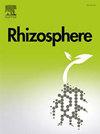Promotion of tomato growth and suppression of plant parasitic nematodes by Trichoderma atroviride: alterations in root metabolomics and soil C/N ratio
IF 3.4
3区 生物学
Q1 PLANT SCIENCES
引用次数: 0
Abstract
Several species of Trichoderma are plant beneficial fungi with nematicidal properties. However, the underlying mechanisms involved in this biocontrol trait need to be further explored. The main aim of this work was to examine the effects of inoculation with T. atroviride on tomato growth, metabolomics and nutrition, and soil C:N ratio in a soil naturally infested with plant parasitic nematodes. Inoculation with T. atroviride promoted shoot and root dry weight in tomato plants. This plant growth promoting effect by the fungus coincided with a reduction in the population density of plant parasitic nematodes and modulation of sucrose concentrations in plant tissues, accumulating this disaccharide mainly in the root. On the other hand, T. atroviride had no effect on bacterivorous and frugivorous nematodes. Additionally, the decrease in plant parasitic nematodes was correlated with alterations in the emissions of volatile compounds emitted by the root system. In sterile soil, the fungus increased the emission of m-cymene and methyl salicylate (Me-SA), whereas in non-sterile soil T. atroviride reduced the emission of these volatiles, which indicates that the fungus modulates the chemical defense in tomato. Finally, inoculation with T. atroviride caused a reduction in the soil C:N ratio, probably due to the decomposition of organic compounds deposited and/or previously present in the rhizosphere. Our results highlight novel aspects of the mechanism involved in biocontrol traits of T. atroviride against plant parasitic nematodes in agricultural soils.
atroviride木霉促进番茄生长抑制植物寄生线虫:根系代谢组学和土壤碳氮比的变化
木霉是几种具有杀线虫特性的植物有益真菌。然而,这种生物防治特性的潜在机制需要进一步探索。在植物寄生线虫自然侵染的土壤中,研究了接种atroviride对番茄生长、代谢组学和营养以及土壤C:N比的影响。接种曲霉素可提高番茄植株的茎部和根的干重。这种促进植物生长的作用与降低植物寄生线虫种群密度和调节植物组织中蔗糖浓度相一致,这种双糖主要在根中积累。另一方面,atroviride对菌食性线虫和果食性线虫没有作用。此外,植物寄生线虫的减少与根系挥发性化合物排放的变化有关。在无菌土壤中,真菌增加了间伞花素和水杨酸甲酯(Me-SA)的释放量,而在非无菌土壤中,T. atroviride减少了这些挥发物的释放量,表明真菌调节了番茄的化学防御。最后,接种atroviride导致土壤C:N比降低,可能是由于沉积和/或先前存在于根际的有机化合物的分解。我们的研究结果突出了农业土壤中atroviride对植物寄生线虫的生物防治特性机制的新方面。
本文章由计算机程序翻译,如有差异,请以英文原文为准。
求助全文
约1分钟内获得全文
求助全文
来源期刊

Rhizosphere
Agricultural and Biological Sciences-Agronomy and Crop Science
CiteScore
5.70
自引率
8.10%
发文量
155
审稿时长
29 days
期刊介绍:
Rhizosphere aims to advance the frontier of our understanding of plant-soil interactions. Rhizosphere is a multidisciplinary journal that publishes research on the interactions between plant roots, soil organisms, nutrients, and water. Except carbon fixation by photosynthesis, plants obtain all other elements primarily from soil through roots.
We are beginning to understand how communications at the rhizosphere, with soil organisms and other plant species, affect root exudates and nutrient uptake. This rapidly evolving subject utilizes molecular biology and genomic tools, food web or community structure manipulations, high performance liquid chromatography, isotopic analysis, diverse spectroscopic analytics, tomography and other microscopy, complex statistical and modeling tools.
 求助内容:
求助内容: 应助结果提醒方式:
应助结果提醒方式:


